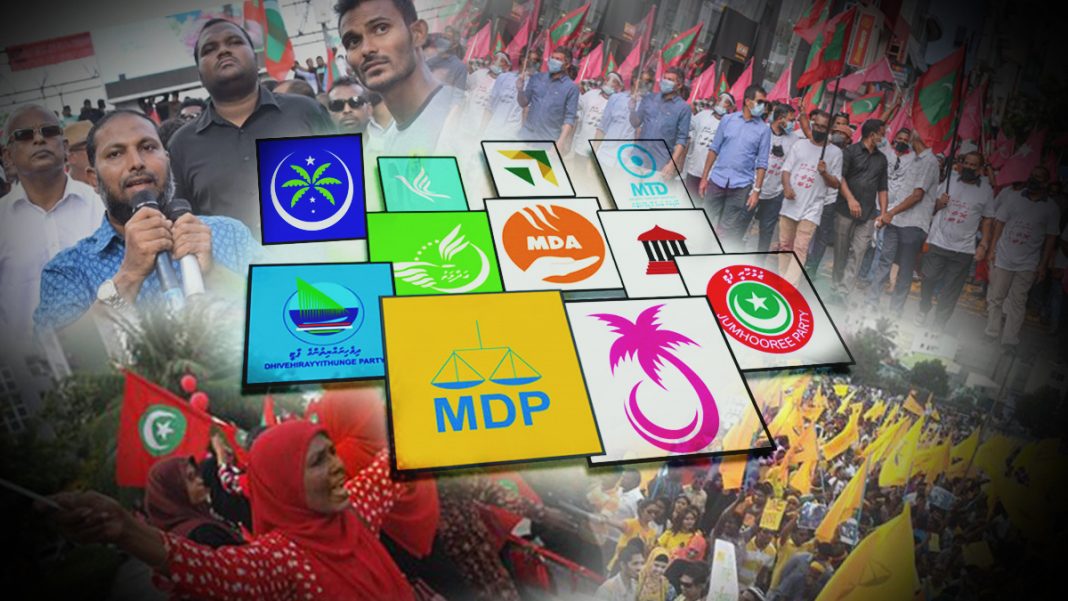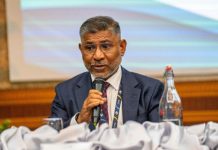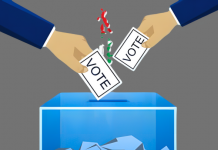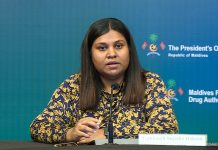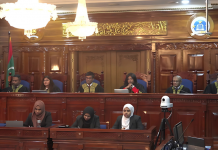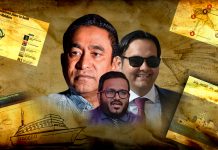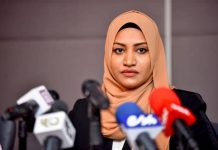President Solih was declared the MDP’s presidential candidate after winning the primary election with 24,572 (61%) votes, compared to his opponent Speaker Nasheed’s 15,631 (39%) votes. Despite Solih’s call for unity, the result is likely to deepen the division between Solih and Nasheed’s factions. Nasheed, the current MDP president and Solih’s childhood friend, has accepted defeat in the primary but is not supportive of Solih’s leadership. He is unsure if Solih will win the presidential election and will decide later which candidate to support. In the 2018 presidential election, Solih was a joint candidate for the opposition alliance, which included MDP, Jumhooree Party, Maldives Reform Movement, and Adhaalath Party. He received congratulations from his coalition partners after the primary results. The role of alliances in gaining power is significant in Maldivian politics, as evident from its political history.
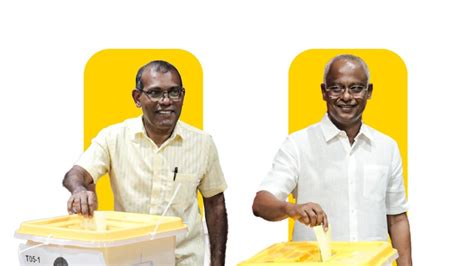
The Dawn of Political Multiplicity in Maldives
June 2nd, 2005 marked a pivotal moment in the history of the Maldives. For the first time, the nation’s parliamentary body voted in favor of allowing multiple political parties. The Maldivian Democratic Party (MDP) was the first to be registered, and former president Gayoom followed suit by creating the Dhivehi Rayyithunge Party (DRP). However, Gayoom eventually resigned from the DRP due to differences and established the Progressive Party of Maldives (PPM).
Following the 2005 resolution, a total of 12 political parties were established in the Maldives. Some of the most influential among them include the Adhaalath Party and the Jumhooree Party, which have played a crucial role in shaping the country’s political landscape.
The beginning of the Coalition government and its challenges
In 2008, Maumoon Abdul Gayoom, who had been serving as the President for nearly 30 years, ratified a newly reformed constitution under immense pressure both domestically and internationally. This paved the way for the Maldives’ first democratic multiparty elections in October of that year. In the first round of elections, Nasheed and Waheed received 44,293 votes (24.91%) compared to President Gayoom’s 71,731 votes (40.34%) of the DRP. However, according to the Maldivian constitution, the President must receive over fifty percent of the votes. If no candidate obtains such a majority, a run-off election must take place within 21 days after the first election. After the second round, the final results showed Nasheed as the President, with his alliance receiving 54.25% of the vote and defeating Gayoom who received 45.75%. This alliance, called the Wathan Edhey Gothah Coalition, included the MDP, Adhalath party and Jumhooriee party. Although it was successful in defeating Gayoom, it proved to be ineffective in running the nation.
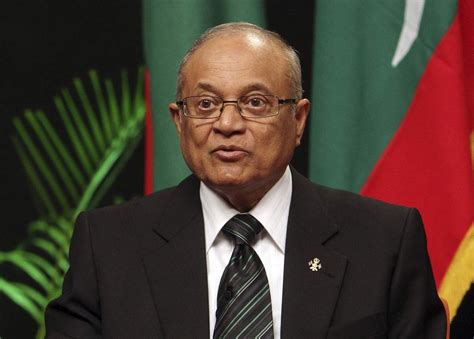
The fall of the Nasheed government
The Maldives experienced its first democratic election with the election of President Nasheed. However, as time passed, the political situation became increasingly challenging for Nasheed to manage. The Dhivehi Qauvmee Party, led by former Attorney General Dr. Hassan Saeed, withdrew its support. The party had previously shown their full support for Nasheed during the presidential runoff elections. Additionally, just four months into his presidency, Jumhooree Party leader Qasim Ibrahim resigned as Home Minister. The main party in the coalition, Adhaalath Party (Islamic Party), also withdrew their support due to religious differences. By the end of Nasheed’s first year in office, his cabinet consisted of only members from his own party and Vice President Waheed’s Gaumee Itthihaad. A power struggle between the president and Parliament continued, and Nasheed was unable to handle the political crisis, eventually leading to his resignation on February 7, 2012.
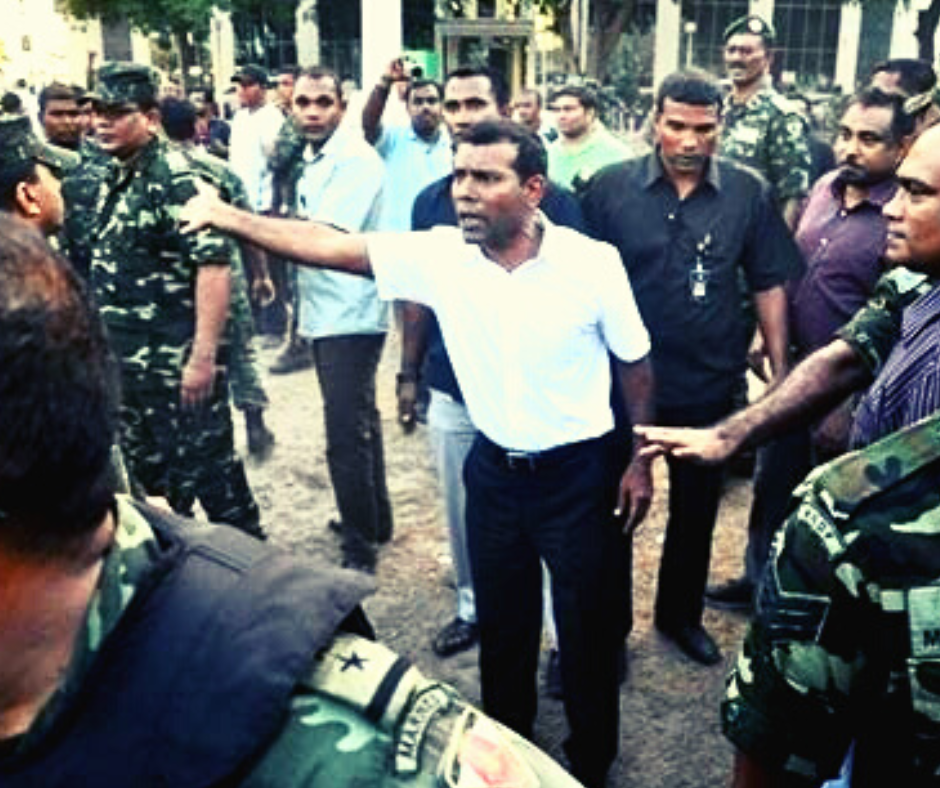
Aftermath of Nasheed’s Resignation – The Transition to Waheed’s Presidency
Following the resignation of President Nasheed, Vice President Dr. Mohamed Waheed Hassan Manik assumed the role of the president. Waheed promised a national government representing all political parties, but initially, his cabinet consisted mostly of supporters of former President Gayoom. Dhuniya, Gayoom’s daughter, was appointed as the State Foreign Minister. The support of the Islamist community helped secure their representation in Waheed’s government, with Mohmed Jameel, the leader of the DQP, appointed as Home Minister. Dr. Hasan Saeed was also chosen as Waheed’s special advisor. Amidst ongoing protests by the MDP and its leader Nasheed, along with international pressure, Waheed was compelled to hold presidential elections ahead of schedule. The first round, which was later annulled, was held on September 7, 2013.
2013 coalition year and Conflict
The 2013 presidential election in the Maldives saw two main contenders, Nasheed of the MDP and Abdulla Yameen of the PPM. President Waheed formed a rainbow coalition which included the Adhaalath Party, but the relationship between Waheed and the party quickly soured when Waheed accused the party of having extremist members. The Adhaalath Party then supported the Jumhooree Party candidate, Gasim Ibrahim, a business tycoon and founder of the Villa Group.

Abdullah Yameen emerged as the winning candidate, supported by Gasim Ibrahim of the Jumhooree Party, the Adhaalath Party, and the Maldives. However, the coalition that brought Yameen to power quickly began to unravel. Ibrahim wanted the post of parliament speaker, while the PPM preferred its candidate, Abdullah Masheeh, for the position. In the end, Abdullah Masheeh became the speaker.
Dissolution of Yameen’s Political Alliance
Fearing a decline in his political power, Yameen began suppressing his opponents. He targeted one opponent after another, including opposition leader Nasheed who was sentenced for the forced kidnapping and unlawful detention of a Chief Judge. Businessman Qasim Ibrahim was also targeted by the government’s actions against his Villa group. Sheikh Imran Abdulla of the Adhaalath Party was sentenced for making anti-government remarks. Yameen even tried to weaken the political influence of his half-brother and former dictator Gayoom.

As a result, Yameen’s coalition partners began to distance themselves from him and joined forces with Nasheed’s MDP to form a joint opposition coalition. The coalition, including MDP, Adhaalath Party, Jumhooree Party, and Gayoom, chose Nasheed as their common Presidential candidate for the 2018 elections. However, the Election Commission threatened to dissolve the MDP if they continued with Nasheed as a candidate. Nasheed was forced to step back and the MDP nominated Ibrahim Solih as their opposition Presidential candidate.
In the 2019 Presidential election, the MDP won 65 out of 87 seats, becoming the first party to achieve a full-fledged majority since democratic elections began in Maldives. Solih became the third democratically elected President of the Maldives after Nasheed and Yameen.
The history of the coalition government
Despite the Maldivian Democratic Party (MDP) winning a full majority in the 2019 presidential election, President Ibrahim Mohamed Solih governs as a coalition leader. Key members of the coalition hold prominent positions in Solih’s cabinet, such as Vice President Faisal Naseem from the Jumhooree Party and Home Minister Sheikh Imran Abdullah of the Adalaath Party.

Traditionally, political parties in the Maldives, despite having significant ideological differences, form coalitions to contest elections, only to break apart post-elections due to conflicting interests. The formation of coalition governments often leads to high demands and political conflicts that result in power struggles. Additionally, there have been instances of parties switching factions in Maldivian political history.
However, in the past four years of Solih’s rule, the only major conflict that has arisen is between Solih and the current speaker, Mohamed Nasheed. This includes the public scandal over the arrest of Nasheed’s younger brother, Ahmed Nazim, on charges of homosexuality, which is a criminal offense in the Islamic Republic of the Maldives. Nasheed claimed that the arrest was influenced by the conservative Adhalath Party.
The absence of major conflicts between the president and other coalition partners is a unique occurrence in the Maldives. During Nasheed and Yasmin’s time, the coalition caused numerous complex political problems. With the 2023 Maldivian election on the horizon, the question remains whether another coalition government will emerge.

